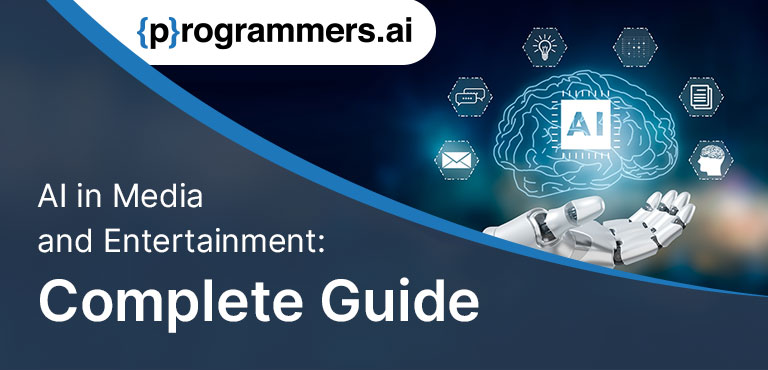We can debate several other aspects of Artificial Intelligence (AI). But no one can dispute that it’s an incredibly disruptive technology. It has already begun transforming several industries, including healthcare and finance. Ironically, the sectors and industries people envisioned would be impacted the least are among the most significantly transformed. We are talking, of course, about the creative industry. “AI in media” has only been a thing for a few years, but it’s already making significant waves. The impact is different in different media domains, but it’s noticeable and transformative in almost all of them.
Role of AI in Media and Entertainment
The role of AI in media and entertainment is still being defined. However, from the media-specific use cases and AI models that already exist, we can safely say that the role is both complex and comprehensive. The most extensively used type of AI around the world right now are Large Language Models or LLMs like ChatGPT. They allow anyone to interact with powerful AI models trained on billions of data points, everything from classic literature to the latest music trends. This makes them a good mine for creatives in media and entertainment. They can get AI to generate ideas for everything from lyrics to a song to entire movie series and novels.
But AI is not limited to ideation. It is also used to generate actual content in multiple forms. AI is strongest in written content generation and can be used in different media domains – Music (lyrics), movies (script), novels (manuscript), etc. AI models are also quite strong in producing images and are being used for animations and visual effects (VFX) in live-action movies. AI use is also evolving in video generation, though it’s still relatively limited. Deepfakes have been around for some time now, and the top-tier Deepfake content is very convincing. We have already seen AI’s use in multiple movies and series, including Star Wars (A Young Luke Skywalker) and Startrek (The Farewell of Two Beloved Characters).
AI is extensively being used behind the screens as well. The common use cases include video editing, correcting vocal pitches in music, and generating resources for games. They are used to create attractive and visually appealing books for kids.
As you might have gathered from this summary, the role of AI in media cannot be summed up as something like assistive, creative, or even disruptive. It’s definitely transformative, but we don’t yet know the extent to which it will transform the industry even in the next couple of years, let alone the next decade.
Advantages of AI in the Media and Entertainment Industry
There are several advantages of using AI in the media and entertainment industry. The most significant ones are:
Efficiency: AI tools can make a wide range of media and entertainment processes far more efficient. They can cut down the time it takes to edit a video, make a soundtrack production ready, edit a book, make illustrations, and a number of other things. This allows moviemakers, creators, writers and other stakeholders in the media and entertainment industry to produce more in a relatively shorter amount of time, making the process more efficient.Leveraging the best AI apps can further streamline these workflows, enabling unparalleled creativity and productivity.
Productivity: One of the greatest benefits of AI is that it can allow almost all stakeholders in the media and entertainment industry to work more efficiently and produce much more than they could through conventional means. This leads to the creation of a much larger body of entertainment being produced in any given year, making the industry more competitive and in some ways, better.
Ideation: AI can help with the generation of some truly unique ideas and even field testing of such ideas. This includes creating different versions of existing lores and expanding existing franchises and creative bodies of works. It is also a good tool for creatives to use when they have a “creative block” and new ideas aren’t coming.
Research: A significant amount of research is needed to write good novels and scripts for movies and games, even in genres like fantasies. AI can streamline this research. It can make summaries and simplify complex ideas for creatives in the industries. It can also help other stakeholders, like producers and editors, identify new opportunities and learn new tools to excel in their domains.
Cost Reduction: AI can significantly cut costs in many media and entertainment ventures. This includes generating free resources for movies and videos and reducing the amount of work needed by editors, film crews, music studios, etc. to generate the same quality and quantity of content.
Democratization: One of the benefits of various AI tools is that several media and entertainment domains are even more democratized now. This was already happening thanks to the internet and open-source tools but AI has given these trends a significant boost. People are making videos and animations without formal training and tools, generating music, creating games, and many other things that would have required significant resources.
It’s important to understand that media production with AI is still in its nascent stages, yet it’s still very impressive. As time passes and technology and AI skills improve, AI-first media creation and development will gain more traction.
Use cases of AI in Media and Entertainment
Let’s look at some of the specific use cases of AI in media and entertainment.
Music
- Generative AI is being used to mimic the music and singing style and can even emulate the exact voice of certain artists. These tools are being developed by leaders in AI like OpenAI and Google, which has access to massive amounts of training data via YouTube.
- To curate playlists based on the kind of music a listener prefers and repeatedly listens to.
- To create new tunes and complete musical tracks.
- Slicing up existing sound tracks for use in other media (like movies and series). It’s called stem separation and the process involves separating specific elements like music or vocals.
- AI tools like LANDR are being used for sound mastering. They offer a range of tools and capabilities not available in conventional digital tools.
The music industry is putting safeguards in place to ensure that no AI-generated work is published or sold as original.
Film
- Visual effects (VFX) in movies have been around for ages, but it’s getting a significant boost thanks to AI – more quality and realism (needed) in a fraction of the time.
- It can be used for comprehensive script analysis. Thanks to context awareness, AI tools can analyze scripts for plot holes, inconsistencies, and other flaws and offer feedback.
- AI and AI-powered tools can be used to edit movies. They are also used to create trailers and perform several other post-production tasks necessary for the creation of the final product.
- AI tools like AutoFoley are used for sound engineering in movies. They analyze the video and motion and generate/synthesize an appropriate soundtrack to go along with the video.
- Producers and studios use AI to evaluate and assess hundreds or even thousands of scripts and choose the ones with the highest probability of success.
This is not a complete answer to “how does AI affect film industry” as its impact is still being understood and absorbed but it should give you a good idea.
Gaming
- One of the most significant and earliest uses of AI is procedural generation, where the world around the player is being generated in real time as they explore it and move forward in the game.
- AI is also being used to create non-playable characters (NPCs) that have more depth and intelligence, making them more interesting for the players to interact with.
- Generating AI is transforming game development in a number of ways – from producing code for the game engine and basic dynamics to creating content and assets inside the game.
- Various AI technologies and even custom algorithms are influencing several aspects of online gaming, from detecting cheaters to pairing up players with similar skill levels.
- Thanks to AI, games can learn from the user’s behavior and adapt to adjust various things like difficulty settings, behavior of enemies and NPCs in game, changing tactics, etc. The idea is to make the experience maximally rewarding for the player.
There are even more significant breakthroughs afoot, with the advent of technologies that allow people to create their own games from simply a prompt.
Advertising
- AI models and algorithms can be used to analyze consumer behavior patterns, giving advertisers crucial insights for marketing.
- Generative AI can be used to create a wide range of advertising resources, including animations, videos, booklets, etc.
- Some AI tools are used to identify the best time and place to advertise, allowing for a more efficient and potent use of advertising budgets (programmatic buying).
Book Publishing
- Like in scripts, AI can help publishers choose the best manuscripts with the highest chance of success. However, it’s not the full extent of AI changing publishing industry.
- Generative AI can help writers with everything from ideas to beta reading and everything in between. It can also help them generate their own cover, transcripts (expanding to audiobook marketing), and marketing (assuming they are self-publishing).
- AI is also being used to generate content for the books though the acceptance of it is relatively low right now but implications are significant.
Content Creation
- Generative AI can be used to create/generate content based on prompts in different formats – written, audio, visual, and video.
- AI tools can be used to modify and improve upon human generated content, applying filters, enhancements, etc.
- A wide range of AI tools are used to generate content that may not fall into categories above like education content, interactive content, and even Augmented Reality and Virtual Reality content.
Examples of AI in the Media and Entertainment Industry
- IBM’s AI model Watson created a trailer for the movie Morgan in 2016.
- AI was used to improve certain aspects of the live-action Lion King, like making a lion walk with a limp.
- A song called “Heart on my sleeve” was created mimicking the voice of Drake and gained a lot of attention.
- Some of the songs by Taryn Southern, one with over two million views (Break Free), were written by AI.
- No Man’s Sky uses both procedural and generative AI to create millions of different worlds and NPCs for players to explore.
- Red Dead Redemption 2, which is arguably one of the best games of the last decade, extensively used AI to make an immersive and relatively consistent world.
- Many famous and heavily sold books have used AI generated covers, including House of Earth and Blood by Sarah J. Maas.
Upcoming Innovations in the Media and Entertainment Industry
The advent of AI in media is only just beginning, and we are already seeing significant breakthroughs and transformations. The most cutting-edge innovations include 3D games generated using text prompts. We can also expect real-time animation creation using AI tools in both gaming and films. AI-generated actors and characters are not too far off either; they may have personalities closely mimicking real humans. We are already seeing completely AI-generated content (novels, movies, videos, etc.), but we can expect marketable products in the near future.
Programmers.ai AI Development Services For Media And Entertainment
The most ironic part of exploring the potential of AI in media is that using AI the right way requires creativity as well. But it also requires the right tools and technologies. Different stakeholders in the media and entertainment industry can leverage a wide range of AI tools and models for a wide range of tasks, whether it’s evaluating a script or editing an animation.
This is where a leader in custom AI development like Programmers.ai comes into play. The company can help you assess your AI needs and develop a comprehensive strategy for the use of AI in media. It can develop and integrate proprietary, customs, and open-source AI and ML models in your production environment and help you in a range of tasks – from decision-making to marketing. Their major strength is that they don’t just specialize in technology but can also help you make smart business decisions with it.
Conclusion
The era of “AI in media” is just beginning. Even though there is pushback, especially in more conventional segments of the entertainment industry like book writing, it’s impossible to pause or even delay AI’s influence. It’s a good idea to see it in a positive light. AI in media doesn’t necessarily hinder or overshadow human creativity. Good practices and regulations can actually help enhance it and make it more accessible and beautiful. Partnering with an AI development company can further streamline this process, ensuring the integration of AI in media is both innovative and ethical.






